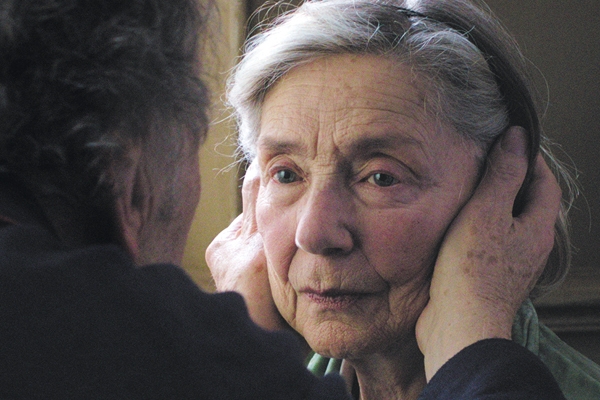This is a film which asks: what happens to love when the person you love is no longer that person?
This stars Jean-Louis Trintignant and Emmanuelle Riva in two of the most shatteringly good performances you will see for an unspecified time period. (Nope. Still not psychic.) They play Georges and Anne, an eighty-something couple who have been married for many years and appear to lead happy, full, active and cultured lives. Both are retired music teachers, and we first encounter them when they return to their Paris apartment after seeing one of her pupils perform in concert. It is a fine-looking apartment, well-furnished, with a baby grand piano, and full of books, music scores and paintings. They’ve had a nice evening, and the pair are pleasantly attentive to each other, in a way which suggests they’ve never stopped talking.
But the following morning, over breakfast, just after she has prepared Georges’s boiled egg, Anne has a stroke. It’s not dramatic. She doesn’t keel over. She just stares frozenly ahead, her beautiful face like a mask. But it’s the first in a series of strokes that will take her from a paralysed arm through to wheelchair, incontinence, dementia, and so on, as Georges has to care for her, which he does with tender grace. (He has promised her she will not end up in hospital.) This is a film which asks: what happens to love when the person you love is no longer that person? What does it do to them? To you? And although ageing with dignity is what we all hope for, when someone has to lift you on and off the toilet and wipe your bum? How can this ever be bearable?
Haneke’s camera, once inside, does not leave the apartment again, and what started as a cosy, cocoon-like place soon becomes a place under siege; a place from which outsiders must be kept at bay. A misjudged visit from that former pupil, who has no idea Anne is ill, is awkwardly embarrassing. They also have a peculiarly tricky, formal relationship with their busy daughter, Eva, and the most educative moment (for me, at least) comes when she berates her father for not returning her calls. ‘I’m concerned,’ she says, angrily. ‘Your concern is of no interest to me,’ says Georges. As her concern does not help get her mother on and off the toilet, or even get the groceries in, why should it be?
This is a film of nuance: the awful moment when Anne first returns home in a wheelchair and Georges has to ask: ‘Which room would you like to go to?’ Or when he first shifts her from wheelchair to bed, which is followed by a moment of tense silence, which Anne has to break. Music is played, but always interrupted. (The music stops?) There are flashes of humour, but not many. There’s a shower scene that will break your heart and, I suspect, never leave you. Haneke never lets audiences off lightly, and he doesn’t let anyone off lightly here. Ageing is cruel. And horrible. And if one of a couple wants to hold on to the one who wishes to let go, how will it end?
The two leads strip themselves of anything that may be showy and are astonishing: conveying fear, tenderness, desperation, misery, love without ever saying too much. It is immensely moving. But, mostly, this is a film which boldly goes where no film has gone before. You won’t be glad to see it, but you will be glad to have seen it. Go.





Comments